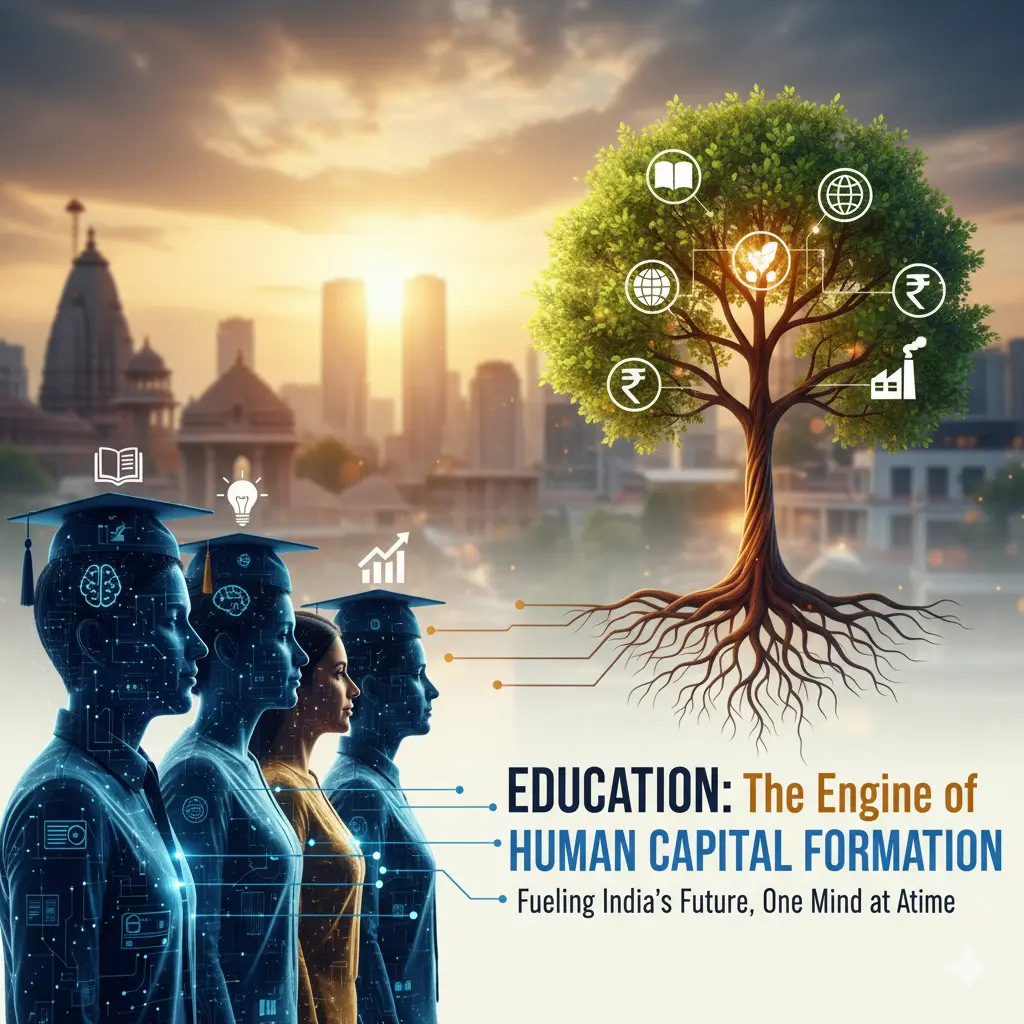Education has always been the backbone of human progress. In today’s knowledge-driven world, education is not just about acquiring degrees it is the foundation of human capital formation. But what exactly does that mean? And why is it so crucial for a developing country like India?
Let’s explore in detail what is the role of education in human capital formation, how it shapes individuals and how it contributes to national growth.
Understanding Human Capital and Education
Before diving deep, let’s first define the key concept.
Human capital refers to the collective skills, knowledge, experience and health that people bring to the workforce. It’s an intangible asset that enhances productivity and drives economic growth.
Education, on the other hand, is the process of learning and personal development that helps individuals acquire new abilities and improve their potential.
When we talk about human capital formation, we mean the process through which a country builds and enhances the quality of its human resources. Education plays the most vital role in this process, as it empowers individuals to become productive, innovative and self-reliant members of society.
Education as an Investment, Not an Expense
One of the most important ideas in economics is that spending on education is an investment.
Unlike physical capital such as machinery or buildings human capital appreciates with use. The more a person learns and applies that knowledge, the more valuable they become to society and the economy.
Why Education is an Investment
Long-term returns: Educated individuals earn higher incomes and contribute more to taxes and innovation.
Improved productivity: Knowledgeable workers can perform complex tasks efficiently.
Reduced unemployment: Skilled workers have more employment opportunities.
In India, initiatives like the National Education Policy (NEP) 2020 and Skill India Mission recognize education as an economic investment that leads to both personal and national development.
Core Roles of Education in Human Capital Formation
Education contributes to human capital formation in multiple ways. Below are its core roles, each supported by real-world implications and Indian examples.
1. Skill Development: Building a Competent Workforce
Education equips individuals with essential skills and technical knowledge required for different professions. From literacy and numeracy to advanced technological expertise, education helps people adapt to the needs of a changing job market.
- Vocational training and skill-based courses make workers more employable.
- Programs like Skill India and PM Kaushal Vikas Yojana (PMKVY) focus on practical training to prepare youth for modern industries.
In short: An educated workforce is more productive, creative and adaptable key ingredients of human capital.
2. Health and Well-being: The Education–Health Link
A lesser-known but powerful effect of education is its impact on health. Educated individuals tend to make better lifestyle and healthcare choices, resulting in a healthier population.
- They are more aware of hygiene, nutrition and disease prevention.
- They access medical services more efficiently.
- Healthier workers are more energetic and have longer working lives.
For instance, in India, states with higher literacy rates like Kerala also show better health indicators and life expectancy, proving the direct link between education and human well-being.
3. Technological Advancement and Innovation
In today’s digital age, education drives technological progress. It enables people to understand, adopt and innovate using new technologies.
- STEM education (Science, Technology, Engineering, Mathematics) builds a foundation for innovation.
- India’s IT sector boom is a direct result of investments in education and technical training.
- Educated youth drive startups, research and new technologies like AI, robotics and renewable energy.
Thus, education acts as a bridge between human creativity and technological innovation, enhancing national productivity.
4. Increased Earning Potential and Reduced Inequality
Education directly impacts income levels and financial independence. Individuals with higher education levels typically earn more and enjoy better job security.
According to data from India’s National Sample Survey, graduates earn significantly more than non-graduates.
Education also reduces economic inequality by empowering underprivileged groups with knowledge and opportunity.
In essence, education creates a fairer society by giving everyone an equal chance to succeed.
Impact of Education on National Development (Indian Context)
1. Education and Poverty Reduction
Education is one of the most effective tools for breaking the cycle of poverty. It equips people with employable skills, leading to better jobs and income stability.
For example, rural education initiatives like Sarva Shiksha Abhiyan and Beti Bachao Beti Padhao have enabled millions of children, especially girls, to continue education and escape poverty.
2. Education and Social Mobility
In a country as diverse as India, education promotes social mobility by allowing individuals to rise above their socio-economic backgrounds.
It creates equal opportunities and empowers marginalized communities to participate in the mainstream economy.
3. Education and Economic Growth
A well-educated population leads to higher productivity and innovation, which fuels GDP growth.
According to World Bank data, countries that invest in education experience faster economic growth and improved living standards.
Example: India’s rise as a global IT and service hub is largely due to its strong base of educated professionals.
Challenges in India’s Education System
Despite progress, India still faces challenges that limit the full potential of education in human capital formation:
- Quality Gap: Many schools lack trained teachers, modern curriculum and adequate infrastructure.
- Access Inequality: Rural and economically weaker sections still struggle for quality education.
- Skill Mismatch: There is often a gap between what is taught in schools and what the job market demands.
- Dropout Rates: Economic pressures cause many students to leave school early, especially in rural areas.
- Digital Divide: Unequal access to technology limits e-learning opportunities.
Addressing these issues through policy reforms, teacher training and digital education can strengthen India’s human capital base significantly.
The Future of Education and Human Capital in India
The future of human capital formation in India depends on how well the country integrates education, technology and inclusivity.
- Digital learning platforms like SWAYAM, BYJU’S and National Digital University are expanding access.
- Industry-academia partnerships can reduce skill mismatches.
- Focus on lifelong learning and reskilling will prepare citizens for the evolving job market.
By aligning education with economic needs, India can create a workforce ready for the challenges of Industry 4.0.
Conclusion:
To sum up, the role of education in human capital formation is central and irreplaceable.
Education builds skills, improves health, enhances income, drives innovation and strengthens the nation’s economy.
In the Indian context, it not only creates employment and productivity but also fosters equality, inclusion and sustainable development.
Investing in education means investing in the future of the nation.
So, when we ask, “What is the role of education in human capital formation?” the answer is clear:
Education is the engine that powers human potential and national progress.
Frequently Asked Questions (FAQs)
Human capital formation refers to the process of improving the quality of human resources through education, training, healthcare and skill development to increase productivity and efficiency.
Education enhances an individual’s skills, knowledge and decision-making ability, making them more productive and innovative. It also improves health awareness and economic opportunities.
Because it yields long-term economic and social benefits. Educated individuals earn higher incomes, contribute to national development and lead healthier, more productive lives.
Initiatives like Skill India, NEP 2020 and Digital India have improved literacy, skill training and digital competence, strengthening India’s workforce.
Key challenges include poor quality infrastructure, teacher shortages, unequal access and a mismatch between education and job market requirements.



